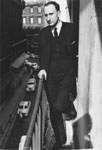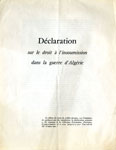The Editions de Minuit was founded at the end of 1941 by Pierre de Lescure and Jean Bruller.
Living clandestinely under German Occupation, they refused the iron hand that crushed freedom of creation.
It was the duty of a publisher of quality literature, working alongside communist intellectual networks, to reveal ‘the spiritual constancy of the French, who have not given in’. (June 1943).
This same desire was expressed brilliantly by Minuit in 1942 with Le Silence de la mer by Jean Bruller, aka Vercors.
For the historian Anne Simonin, the book ‘does not only offer a model of engaged literature, it is an incitement to take action, for the writer to become involved.’
Born in Paris in 1925 in a Jewish bourgeois family, Jérôme Lindon joined the Resistance when he was very young. He joined the maquis then the army of Liberation.
When the war was over, his passion for books led him into publishing, with the encouragement of his father. He found a job with Editions de Minuit.
In 1948, when the house had financial problems, he became a shareholder then director.
His reputation as a publisher comes largely from his total engagement during the Algerian war, in the same manner that the clandestine Editions de Minuit had gained prestige earlier.
With writers such as Beckett and Robbe-Grillet, from 1957 onwards he published 23 books that denounce the injustice of the struggle against the Algerians who were fighting for their independence.
Nine of his books were seized between March 1958 and November 1961.
Jérôme Lindon, who was closely watched by the government, supported authors, replied to critics and assured the diffusion of forbidden texts through parallel networks.










